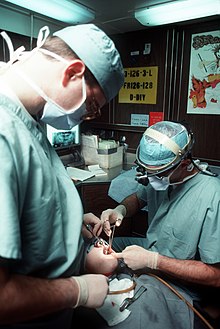Department Introduction

Dentistry
 A dentist treats a patient with the help of a dental assistant. | |
| Occupation | |
|---|---|
Occupation type | Profession |
Activity sectors | Health care, Anatomy, Physiology, Pathology, Medicine, Pharmacology, Cosmesis, Surgery |
| Description | |
| Competencies |
|
Education required | Dental Degree, Medical Degree |
Fields of employment |
|
Related jobs | |
| ICD-9-CM | 23-24 |
|---|---|
| MeSH | D003813 |
Dentistry, also known as dental medicine and oral medicine, is a branch of medicine that consists of the study, diagnosis, prevention, and treatment of diseases, disorders, and conditions of the oral cavity, commonly in the dentition but also the oral mucosa, and of adjacent and related structures and tissues, particularly in the maxillofacial (jaw and facial) area.[1] Although primarily associated with teeth among the general public, the field of dentistry or dental medicine is not limited to teeth but includes other aspects of the craniofacial complex including the temporomandibular joint and other supporting, muscular, lymphatic, nervous, vascular, and anatomical structures.
Dentistry is often also understood to subsume the now largely defunct medical specialty of stomatology (the study of the mouth and its disorders and diseases) for which reason the two terms are used interchangeably in certain regions.[where?]
Dental treatments are carried out by a dental team, which often consists of a dentist and dental auxiliaries (dental assistants, dental hygienists, dental technicians, as well as dental therapists). Most dentists either work in private practices (primary care), dental hospitals or (secondary care) institutions (prisons, armed forces bases, etc.).
The history of dentistry is almost as ancient as the history of humanity and civilization with the earliest evidence dating from 7000 BC. Remains from the early Harappan periods of the Indus Valley Civilization (c. 3300 BC) show evidence of teeth having been drilled dating back 9,000 years.[2] It is thought that dental surgery was the first specialization from medicine.[3] The modern movement of evidence-based dentistry calls for the use of high-quality scientific evidence to guide decision-making.

